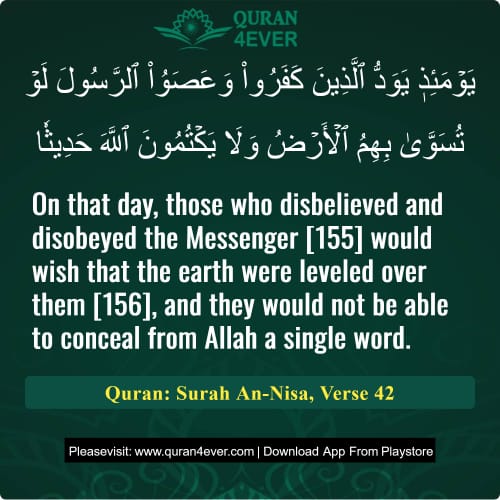
Transliteration:( Yawma'iziny yawad dullazeena kafaroo wa'asawur Rasoola law tusawwaa bihimul ardu wa laa yaktumoonal laaha hadeesaa )
"On that day, those who disbelieved and disobeyed the Messenger [155] would wish that the earth were leveled over them [156], and they would not be able to conceal from Allah a single word."
This verse highlights the dual failure of the disbelievers:
"They disbelieved" refers to corruption in faith—rejection of Allah, His Oneness, or His Messenger.
"They disobeyed the Messenger" refers to corruption in deeds—opposing or ignoring the commands of the Prophet ﷺ.
From this we learn:
Every believer must make it a lifelong effort to perfect both faith and actions,
For defects in either will bring regret and ruin in the Hereafter.
The verse describes their utter despair:
On the Day of Judgment, the disbelievers will wish that they could vanish—
that the earth would flatten over them, ending their torment.
This reflects:
The hopelessness and shame they will feel in front of Allah.
The futility of their denial, as they cannot hide even a word from Allah.
Allah mentions in Surah An-Naba (78:40):
“The disbeliever will say, ‘Would that I were dust!’”
This shows:
They would rather be reduced to dust like animals,
Just to escape the severity of judgment and punishment.
The tafsir of Surah Nisa verse 42 by Ibn Kathir is unavailable here.
Please refer to Surah Nisa ayat 40 which provides the complete commentary from verse 41 through 42.
(4:42) Those who disbelieved and disobeyed the Messenger will wish on that Day that the earth were levelled with them. They will not be able to conceal anything from Allah.
There is no commentary by Abul Maududi available for this verse.

For a faster and smoother experience,
install our mobile app now.
Related Ayat(Verses)/Topics